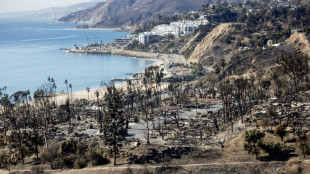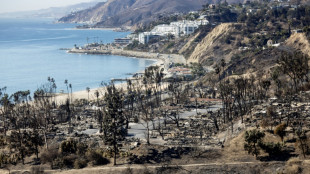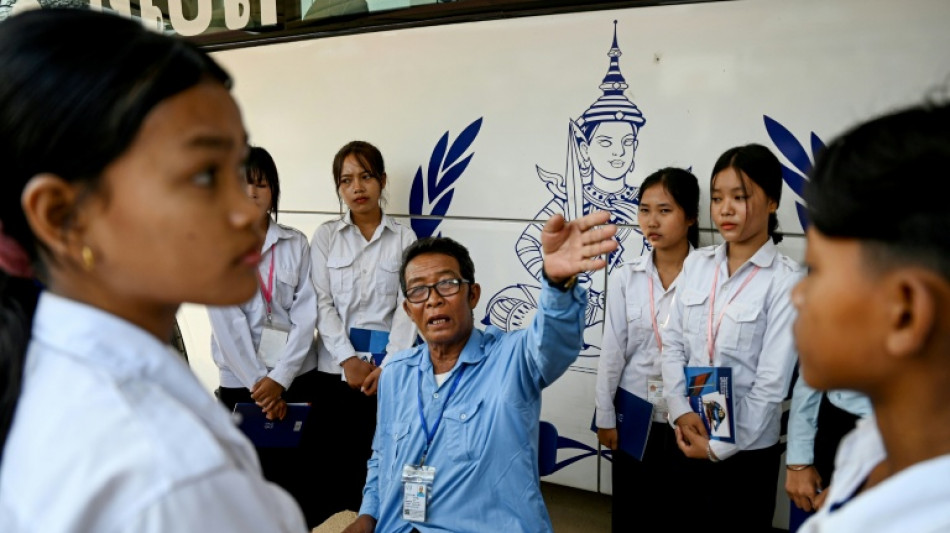
-
 Unstoppable Pogacar targets more history at season-ending Il Lombardia
Unstoppable Pogacar targets more history at season-ending Il Lombardia
-
Ex-All Black Kerr-Barlow relishing Top 14 reunion with 'juggernauts' La Rochelle

-
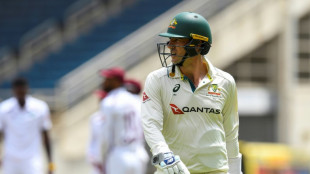 Australia in 'tight' race to have Cummins fit for Ashes opener
Australia in 'tight' race to have Cummins fit for Ashes opener
-
Giants stun Super Bowl campion Eagles 34-17

-
 Plastic pollution treaty not dead in the water: UN environment chief
Plastic pollution treaty not dead in the water: UN environment chief
-
Major quake strikes off southern Philippines

-
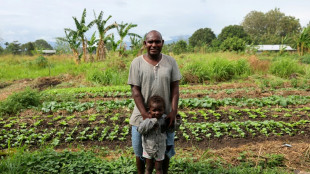 'Backyard fireworks' of WWII bombs still litter Solomon Islands
'Backyard fireworks' of WWII bombs still litter Solomon Islands
-
Europe needs reusable rockets to catch Musk's SpaceX: ESA chief

-
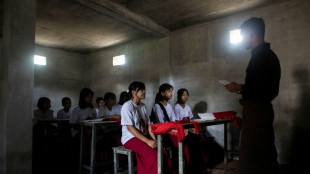 Myanmar air strikes force youth into bunker schools
Myanmar air strikes force youth into bunker schools
-
Asian markets limp into weekend as AI bubble fears grow

-
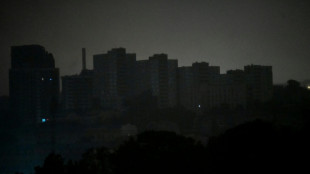 'Massive attack' cuts power in Ukrainian capital
'Massive attack' cuts power in Ukrainian capital
-
Dodgers win thriller to advance after Phillies blunder

-
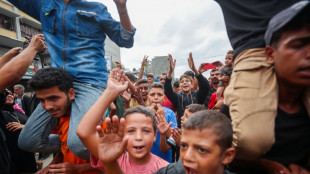 Israel government approves Gaza hostage release deal
Israel government approves Gaza hostage release deal
-
Venezuela ask for UN Security Council meet over US 'threats'
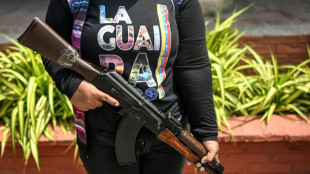
-
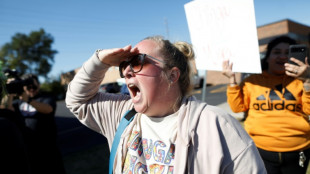 Fear and fury at ICE facility protest near Chicago
Fear and fury at ICE facility protest near Chicago
-
Morocco youth ask for king's ear at fresh protests
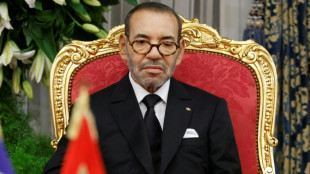
-
 Comeback studio Warner takes 'victory lap' amid takeover rumors
Comeback studio Warner takes 'victory lap' amid takeover rumors
-
Death of 'sweet king': AI chatbots linked to teen tragedy

-
 Arc de Trump? New monument model sits on US president's desk
Arc de Trump? New monument model sits on US president's desk
-
Sam Kerr poised to return for Australia's Matildas

-
 US judge tosses Drake lawsuit over Lamar diss track
US judge tosses Drake lawsuit over Lamar diss track
-
Judge halts Trump's Chicago troop deployment as Portland decision looms
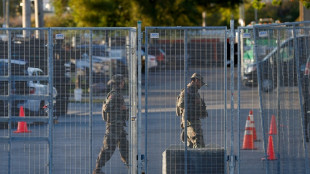
-
 Lakers' James to miss NBA season-opener with sciatica: reports
Lakers' James to miss NBA season-opener with sciatica: reports
-
Saka lights up England's confident friendly win over Wales

-
 RFK Jr pushes fringe claim linking autism to circumcision
RFK Jr pushes fringe claim linking autism to circumcision
-
Tuchel slams 'silent' England fans

-
 Ex-Celtics star Pierce arrested on suspicion of drink driving
Ex-Celtics star Pierce arrested on suspicion of drink driving
-
Scotland sink Greece to boost bid to reach World Cup

-
 Scotland keep World Cup dream alive with Greece comeback, Dutch win
Scotland keep World Cup dream alive with Greece comeback, Dutch win
-
Trump says 'stepping up pressure' to end Ukraine war
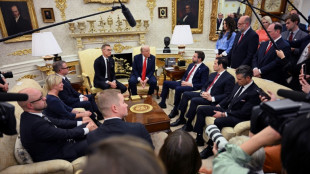
-
 Saka gem headlines England's confident friendly win over Wales
Saka gem headlines England's confident friendly win over Wales
-
US finalizes $20 bn economic lifeline for Argentina, buys pesos

-
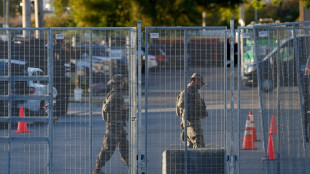 Troops deploy in Chicago as US courts hears challenges
Troops deploy in Chicago as US courts hears challenges
-
Chiefs, Ravens look for spark amid early season struggles

-
 Argentina gives Boca Juniors manager Russo emotional stadium send-off
Argentina gives Boca Juniors manager Russo emotional stadium send-off
-
French guillotine abolitionist enters Pantheon
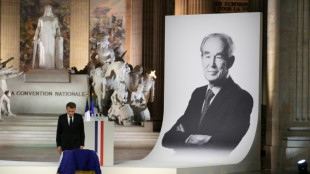
-
 Amoura scores twice as Algeria qualify for 2026 World Cup
Amoura scores twice as Algeria qualify for 2026 World Cup
-
Trump eyes Egypt trip, says hostages to be freed early next week

-
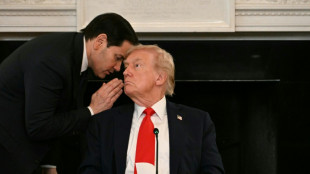 An urgent note, a whisper -- and a Gaza deal long sought by Trump
An urgent note, a whisper -- and a Gaza deal long sought by Trump
-
Police clash with protesters as thousands rally in Madgascar
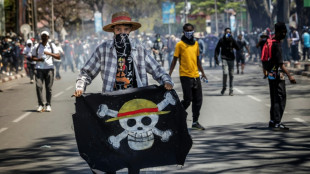
-
 Serbia faces 'extremely serious' impacts as sanctions hit oil firm
Serbia faces 'extremely serious' impacts as sanctions hit oil firm
-
Rediscovered painting shows madam of notorious Nazi brothel
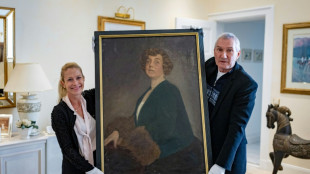
-
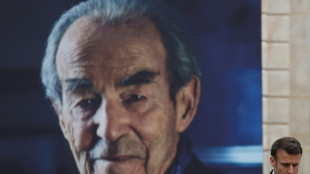 Grave of French guillotine abolitionist defaced before Pantheon ceremony
Grave of French guillotine abolitionist defaced before Pantheon ceremony
-
At German auto crisis meet, Merz vows to fight EU gas guzzler ban

-
 Italian athlete gets three-year ban for spying on Olympic champion Jacobs
Italian athlete gets three-year ban for spying on Olympic champion Jacobs
-
French court ups jail term for man in Pelicot rape case appeal
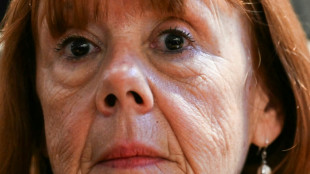
-
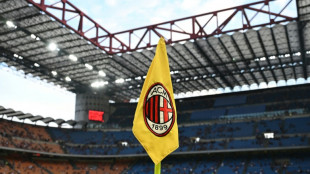 Rabiot backed by French players' union in row over Serie A match abroad
Rabiot backed by French players' union in row over Serie A match abroad
-
Hungary's 'master of the apocalypse' Krasznahorkai wins literature Nobel
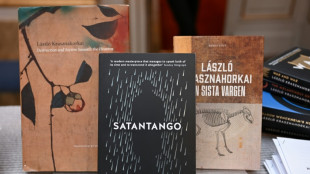
-
 Israel says 'all parties' signed phase one of Gaza deal
Israel says 'all parties' signed phase one of Gaza deal
-
Nepal's youth vow to keep up pressure, one month after unrest
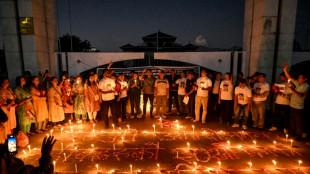
| CMSC | -0.08% | 23.69 | $ | |
| JRI | -0.79% | 14.01 | $ | |
| RBGPF | -0.24% | 75.55 | $ | |
| CMSD | -0.25% | 24.27 | $ | |
| SCS | -1.57% | 16.53 | $ | |
| AZN | -0.4% | 85.04 | $ | |
| NGG | -0.38% | 73.33 | $ | |
| GSK | 0.21% | 43.44 | $ | |
| BCC | -3.42% | 73.89 | $ | |
| RIO | -1.04% | 67 | $ | |
| RYCEF | -0.39% | 15.35 | $ | |
| BCE | 0.9% | 23.44 | $ | |
| BTI | -0.47% | 51.36 | $ | |
| VOD | 0.09% | 11.28 | $ | |
| RELX | -1.53% | 45.15 | $ | |
| BP | -0.67% | 34.29 | $ |

Lessons in horror with Cambodia's Khmer Rouge tribunal
Sheltering in the shade of a bus repurposed into a mobile museum, Mean Loeuy tells a group of children about the hell he went through in a Khmer Rouge labour camp.
"At the beginning we shared a bowl of rice between 10 people," recounts the 71-year-old man who lost more than a dozen family members during Cambodia's bloodiest era.
"By the end, it was one grain of rice with a splash of water in the palm of our hands," he says, describing the camp as "like a prison without walls".
The children look on with expressions ranging from nonplussed to horror.
Mean Loeuy is one of a handful of survivors supporting the latest project of the Extraordinary Chambers in the Courts of Cambodia (ECCC), the UN-sponsored tribunal that delivered its last verdict on Pol Pot's brutal regime in September 2022 before wrapping up its trials.
Since January last year, a team led by a lawyer has travelled around Cambodia teaching schoolchildren about the government it ruled as genocidal, sharing 20 years' worth of evidence and testimony from victims such as Mean Loeuy.
The capital Phnom Penh fell to the Khmer Rouge 50 years ago on Thursday, but now two-thirds of Cambodia's population are under 30.
Most grew up without living through the horrors of Pol Pot's rule between 1975 and 1979, nor the 20 years of conflict that followed.
Many young people have no more than an inkling of the grimmest period of their country's history -- one still haunted by the deaths of around two million people through starvation, disease, forced labour or murder.
- Human skulls -
In a high school courtyard in Phnom Srok in the nation's northwest, dozens of children squeeze into the air-conditioned vehicle -- a bus specially adapted to hold interactive history classes, with comics, iPads and other resources.
About 10 kilometres (six miles) away lies the Trapeang Thma reservoir where Mean Loeuy laboured, one of the Khmer Rouge's most notorious projects, accounting for thousands of worker fatalities.
At a Buddhist temple in the town, the skulls of victims of the Khmer Rouge line the shelves.
But Mouy Chheng, 14, admits she had difficulty believing the "brutality" of the ultra-Maoist government that her parents had told her little about.
"I was not born under the Khmer Rouge. I came to learn here... and understand the difficulties under the previous regime. Now I understand a lot more," she tells AFP.
The educational initiative reached more than 60,000 children and teenagers at 92 institutions in 2024, according to the ECCC, and aims to visit 100 schools this year.
In a classroom, lawyer Ven Pov passes a microphone around between 150 or so high school students.
"Why wasn't Pol Pot tried?", "why weren't (convicted Khmer Rouge cadres) given the death penalty?", "how is it possible that famine killed so many?", they ask one after another.
The 56-year-old Ven Pov tries his best to answer their questions but admits he still wonders why the Khmer Rouge committed such atrocities.
"We do not have answers," he says. "We need to do more research."
- 'Symbolic legacy' -
Back in the capital, the ECCC preserves hundreds of thousands of Khmer Rouge documents that are open to researchers and anyone interested.
Of the scores of ageing former leaders of the ultra-Maoist movement living freely in Cambodia, the ECCC convicted only three.
Former prime minister Hun Sen has pushed for peace and social cohesion, but critics say he sought to exploit the hybrid Cambodian-international tribunal to avoid prosecuting more Khmer Rouge cadres -- of which he was once one.
"Justice and reconciliation go hand in hand," says Ven Pov, who attributes the lack of trials to a widespread desire for unity.
"Victims want justice, but they also want peace, national unity and reconciliation."
Nonetheless, Timothy Williams, a professor at Bundeswehr University in Munich, says "transitional justice isn't just about those who committed the crimes, it's also a symbolic legacy for society".
The educational bus could have started its tours 15 years ago, he said, but added: "It's important at a time marked by the strengthening of authoritarian power.
"The lessons of the past are crucial here."
K.Sutter--VB


